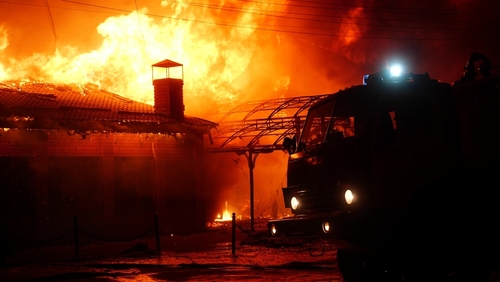In a stark escalation of tensions, Russian state-run Rossiya 1 TV has broadcasted a threat to European capitals with long-range missile strikes. This alarming rhetoric was aired during a primetime segment, highlighting the potential for Moscow to target key cities across Europe if hostilities continue to escalate.
Nuclear saber rattling from Moscow is nothing new at this point, but that the station identified specific areas and outlined them specifically on a map is a slight escalation. Enough slight escalations and one soon has a significant escalation.
https://t.co/X0TGlrZv77 Russia’s state-run Rossiya 1 TV channel ran a segment on Sunday evening which appeared to be in direct reaction to the US recently announcing it plans to place long-range missiles in Germany.
— SASSYCHICK (@KT07500539) July 16, 2024
The broadcast comes amidst growing anxieties over the conflict in Ukraine and the increasing military support Kyiv is receiving from NATO allies. Russian President Vladimir Putin has been vocal about his displeasure with Western nations supplying Ukraine with long-range precision weapons. During a recent press conference, Putin warned that Russia could respond asymmetrically by arming adversaries of the West with similar long-range missiles.This development follows several countries, including the United States, the United Kingdom, and Germany, greenlighting the use of advanced long-range weapons by Ukrainian forces to strike targets within Russian territory.
Previously, Western aid was contingent upon these weapons not being used to attack Russian soil, but the shifting dynamics on the battlefield have prompted a change in strategy.
◾️ @SadiqKhan you said that "London is well prepared for a nuclear attack."
This is what would happen if one of Russia's 5,000 nuclear bombs lands on London.
"London, Slough, Watford, & Essex a would be destroyed. Estimated fatalities are 2,792,630 & injuries is 2,756,780." pic.twitter.com/2UZZ8YBaC0
— David Atherton (@DaveAtherton20) March 1, 2022
In addition to the threats against Europe, Putin hinted at the possibility of deploying Russian warships and aircraft to regions such as the Caribbean, signaling a broader scope of military posturing. The Kremlin's stance underscores the potential for a more expansive conflict if diplomatic resolutions are not pursued.
The situation has prompted various responses from global leaders. U.S. Senator Mike Rounds confirmed that Ukraine has indeed utilized U.S.-supplied weapons against Russian targets, though he refrained from providing specific details. Meanwhile, NATO's Eastern European members, particularly the Baltic states, remain on high alert due to their historical and geographical proximity to Russia.
European capitals, including Berlin, Paris, and London, are now under direct threat from Moscow’s missile capabilities, with potential strikes originating from the Kaliningrad region. This enclave, situated between Poland and Lithuania, provides a strategic launching point for Russian missile systems, thereby increasing the immediacy of the threat.
The international community continues to monitor the situation closely, with diplomatic channels being urged to de-escalate the rising tensions. The ongoing conflict in Ukraine, coupled with these recent threats, underscores the precarious balance of power in the region and the potential for broader conflict if negotiations fail to yield a peaceful resolution.




